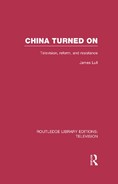China Turned on
The years following the Cultural Revolution have seen the arrival of television as part of China's effort to 'modernize' and open up to the West. Endorsed by the Deng Xiaoping regime as a 'bridge' between government and the people, television became at once the official mouthpiece of the Communist Party and the most popular form of entertainment for Chinese people living in the cities. But the authorities failed to realize the unmatched cultural power of television to inspire resistance to official ideologies, expectations, and lifestyles.
The coming of television has intensified the fundamental contradictions of China's socialist society. Its presence in the homes of the urban Chinese has strikingly broadened the cultural and political awareness of its audience and has provoked the people, long treated as compliant recipients of state ideology, to imagine better ways of living as individuals, families, and as a nation. In China after Tiananmen Square, television remains crucially important in the continuing struggle for freedom and democracy.
Set within the framework of China's political and economic environment in the modernization period, James Lull's insightful analysis is based on ethnographic data collected in China before and after the Tiananmen Square disaster. He has interviewed leading Chinese television executives and nearly one hundred families in Beijing, Shanghai, Guangzhou, and Xian. Lull shows how Chinese television fosters opposition to the government through the work routines of media professionals, the polysemy of television imagery, and the roles of critical, active audience members.
James Lull is a writer and broadcaster based in San Francisco, California. He is author of Inside Family Viewing (1990), and editor of World Families Watch Television (1988) and Popular Music and Communication (1991).
